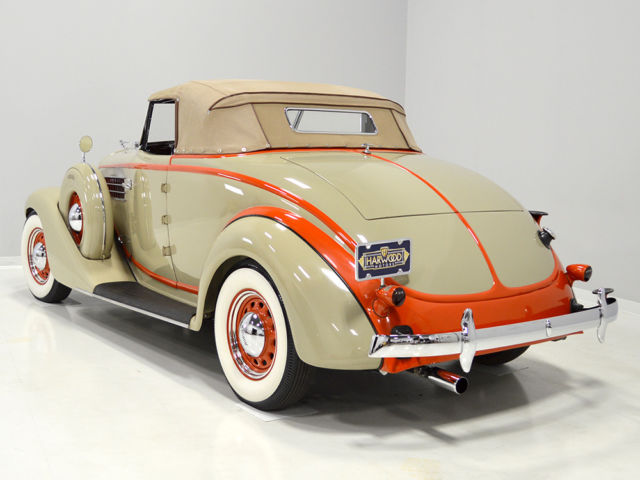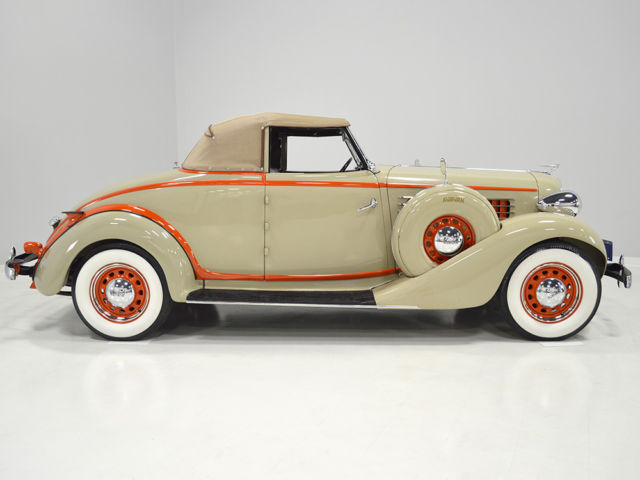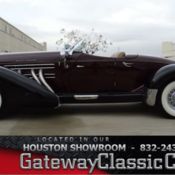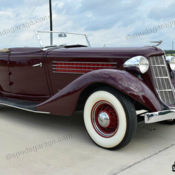|
Looking through automotive history, there are a lot of great names and great stories to be told, but few stand taller than the Auburn-Cord-Duesenberg empire created by visionary E.L. Cord. Using a combination of ingenuity, hustle, and plan-old salesmanship, he almost single-handedly transformed Auburn from a frumpy albeit sturdy family car into the most dashing must-have marque of the era. Although the Auburns were technically the "entry level" cars at ACD dealerships, they were quickly recognized for their cutting-edge styling, impressive performance, and extensive use of up-to-the-minute technology. In the 1930s, owning an Auburn was something special, and that remains equally true today. This exceptionally pretty 1936 Auburn 654 cabriolet is one of only 190 built in 1936, Auburn's final year of production. It spent most of the past 20 years on display at the Auburn-Cord-Duesenberg Museum in Auburn, Indiana, and if you do a Google search, you'll see that it was a favorite photography subject of most of the museum's visitors. Shortly before it was loaned to the Museum, it was treated to a very high-quality frame-off restoration that left no loose details, because the car is just beautifully finished in every way and highly functional. Earlier in 2017, the Museum decided to return the car to its owners and learned that in the intervening years, the car had been sold and the new owner of the car (who permitted it to remain on display at the Museum) had sadly passed away. The family, with no real connection to the car, decided not to keep it, and it came to us directly from the Museum. Of course, after more than two decades of inactivity, the car needed some servicing. Cosmetically, it remains excellent, with beautiful Sahara Tan paint work accented by bright orange belt moldings and wheels, a traditional color combination that could have been how this car was originally delivered. It's certainly flashy enough to live up to the Auburn image. The dramatic Gordon Buehrig styling looks as wonderful on the six-cylinder cabriolet as it does on the stunning boattail speedster, and this handsome convertible is fitted with rather rare dual sidemounts, giving it a big car look. The paint is excellent throughout, showing some shelf wear from living in a museum for many years, but that also means it was never exposed to the elements and while it was probably touched and handled fairly often, there are no parking lot dings, no brushes with something in the garage, and only light marks from being polished for all those years. It is uniformly excellent thanks to the care it received at the ACD Museum, and they obviously know how to treat a car that's on display. The chrome was all restored at the same time, and it remains bright, shiny, and almost completely free of defects. As I mentioned, the restoration was extremely well done and surely very expensive, so there are bright, smooth surfaces on the bumpers, crisp details on the "Auburn Man" hood ornament, and the small detail parts are excellent. Both taillights show correct glass lenses with "AUBURN" printing on their faces, the step pads to the bumble seat are properly finished, and the rubber running board covers are still in very good condition, showing no delamination or cracking. Both sidemounts are fitted with metal covers and integral rear-view mirrors, as well as handsome AUBURN decals that remind onlookers that this is something special. The brown leatherette interior was restored to factory specs as well, and it remains comfortable and quite correct. You sit down low and deep in the cabriolet, but that's purely intentional to achieve that sleek, low profile roofline. Matching door panels feature map pockets and arm rests, and since it's an open car, plain rubber mats are on the floor. Beautiful engine-turned panels house the gauges in front of the driver and form the glove box lid on the passenger's side, a look that was an Auburn trademark for many years. All the gauges are fully operational save for the fuel gauge, which uses a capillary tube that was unreliable even when new, and the clock, which may simply be disconnected (we have not investigated). You will note that both of the unique windshield wiper motors are in place and they both work properly, and there's an accessory Crosley AM radio in the center of the dash, and yes, it works too! The knob on the center of the steering wheel controls the two-speed rear axle, which gives this Auburn true 60+ MPH cruising speeds and good around-down punch, and thanks to a recent service, it's working correctly. The car was originally equipped with a Startix system, and the control unit is included with the car, but today it starts using a button in the center of the dash and it seems to work just fine. Overhead, there's a beautiful canvas 3-position top that's expertly fitted and folds easily, although there's some slight discoloration due to the fact that the museum displayed it in the second position, with the forward half of the top stowed. It stacks neatly behind the front seat where it is covered by a matching boot. The rumble seat is covered in the same leatherette and I suspect that it has not been used but a handful of times because it looks almost new. There are some inexperienced hobbyists who will look down on this car because of its 210 cubic inch inline-6 powerplant, but that's a mistake. With seven main bearings, it's smooth and almost indestructible, and on paper, it only gives up 15 horsepower to its eight-cylinder brothers. On the road, it's energetic and eager to rev, pulling the relatively lightweight cabriolet around with genuine enthusiasm, particularly with the rear axle in low range. It's content to cruise at 60 MPH without seeming to work very hard and there's good torque everywhere, so you never feel that you've traded down in the horsepower department. As I mentioned, the car needed extensive servicing after decades of static display, so we pulled the gas tank and had it re-lined, rebuilt both the fuel pump and carburetor, rebuilt all four brake cylinders and the master cylinder, pulled the radiator and had it boiled out, and then refilled everything with fresh lubricants and fluids. The car runs superbly today, starting with a little choke and quickly settling into an easy idle that is never fussy. On most days, it runs at about 180 degrees and never shows signs of getting hot (we back-flushed the block as well). Oil pressure is good and it makes the most pleasing mechanical sounds we've heard in a long time. You'll note that the head is aluminum, which certainly helps with heat control and shaves weight, making this Auburn feel nimble indeed. The wiring harness was brand new at the time of restoration and remains in excellent condition, and while the Startix system is not installed, there are provisions in the wiring harness for its reinstallation. This car is ready to tour. The transmission is a 3-speed manual with synchromesh on 2nd and 3rd, so it shifts beautifully. Most of the time, we leave the rear axle in high range, which reduces it to about a 3.4:1 ratio. It's a little soft off the line, but once underway, it easily keeps up with traffic. Low range is great for around town driving, but is limited to about 40 MPH, and we've found that in most circumstances, 2nd gear in high range is perfect for handling traffic. Brakes are hydraulic and impressively powerful and the handling is agile, making this a car that feels confident under any circumstances. The undercarriage is nicely detailed with correct finishes and new wiring and lines throughout, all of which were done shortly before the car went into the Museum. There's some surface scale on the exhaust system, but it, too, appears to be virtually new. Correct artillery wheels look great and are wrapped in 20-year-old 6.50-16 Firestone wide whitewall tires (with very little use, obviously), so if long-distance touring is in your future, I might recommend a fresh set of tires. This is a truly wonderful automobile. It runs and drives superbly and looks simply spectacular. The restoration was unquestionably very expensive 20 years ago and remains in first-class condition today. Not quite a show car, but very, very good, ideal for touring. And relative to its 8-cylinder siblings, it's affordably priced, allowing you to get into all the ACD events with an open car that can still tour with the biggest and fastest machinery of the era. There's simply nothing that this car does badly and it's very easy to love. Call today!
|
 Home
Home Contact us
Contact us NEWEST CARS
NEWEST CARS SELL YOUR CAR
SELL YOUR CAR FAQ
FAQ















